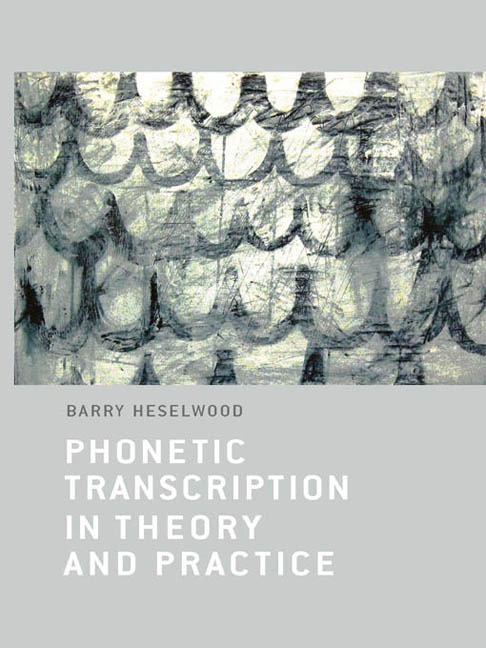Book contents
- Frontmatter
- Contents
- List of Tables
- List of Figures
- Preface
- Acknowledgements
- Introduction
- 1 Theoretical Preliminaries to Phonetic Notation and Transcription
- 2 Origins and Development of Phonetic Transcription
- 3 Phonetic Notation
- 4 Types of Transcription
- 5 Narrow Impressionistic Phonetic Transcription
- 6 Phonetic Transcription in Relation to Instrumental and Other Records
- 7 Uses of Phonetic Transcription
- Glossary
- References
- Appendix: Phonetic Notation Charts
- Index
Preface
Published online by Cambridge University Press: 07 December 2017
- Frontmatter
- Contents
- List of Tables
- List of Figures
- Preface
- Acknowledgements
- Introduction
- 1 Theoretical Preliminaries to Phonetic Notation and Transcription
- 2 Origins and Development of Phonetic Transcription
- 3 Phonetic Notation
- 4 Types of Transcription
- 5 Narrow Impressionistic Phonetic Transcription
- 6 Phonetic Transcription in Relation to Instrumental and Other Records
- 7 Uses of Phonetic Transcription
- Glossary
- References
- Appendix: Phonetic Notation Charts
- Index
Summary
Why write a book on phonetic transcription? After more than half a century of major advances in instrumental phonetics which have rightly taken credit for broadening and deepening our knowledge of the structure of speech, it can appear to many that symbols and transcription have had their day. What, it might be asked, can [d] ever tell us that spectrograms, palatograms and the like cannot? If traditional transcription is not to fade away or be made the amanuensis of automated forms of analysis, then a case must be made for it on the grounds that it can express something which instruments cannot. Arguments need to be put against the view that there is nothing to be gained in phonetics by listening analytically to people speaking and transcribing what we hear. Marshalling the arguments provides the opportunity not only to examine critically the aims and methods of transcription but also to think about how phonetic symbols work in relation to phonetic theory on the one hand and phonetic data on the other; to consider, that is, the manner of their semiosis. This book attempts to address these issues and to place them in the context of the historical emergence of transcriptional resources from resources for writing language, the development of phonetic theory, and their coming together to make what I refer to as proper phonetic transcription possible.
If any time and place can be identified as when and where the ideas for this book originated, it is nearly twenty-five years ago when I started teaching phonetics to speech and language therapy students at Leeds Polytechnic, later Leeds Metropolitan University. There were quite intensive practical phonetics classes and tests involving transcriptions of clinical as well as non-clinical speech samples which had to be marked. Anyone who has had to transcribe difficult clinical speech data, and judge the accuracy of others’ transcriptions, might agree that there is nothing quite like it for making one realise that fair copies do not, and cannot, exist. And yet not all transcriptions are equally insightful.
- Type
- Chapter
- Information
- Phonetic Transcription in Theory and Practice , pp. xiii - xivPublisher: Edinburgh University PressPrint publication year: 2013



